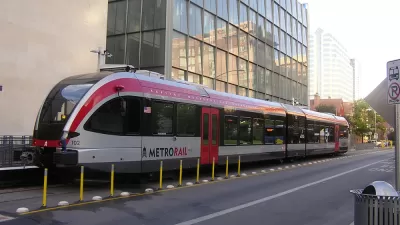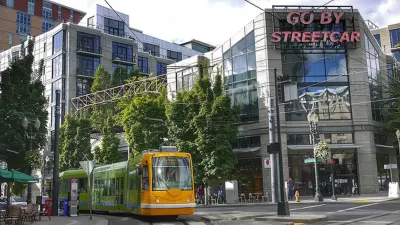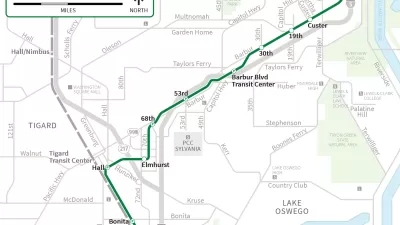In a pair of articles, Jonathan Maus reports on the final moments of the SW Corridor Light Rail Project, as project supporters deals with a loss at the ballot box.
"The project was set to receive $975 million from the Metro funding measure that failed at the ballot box on November 3rd. Without the money, there’s no path forward for the project and officials say it will be put to bed until further notice," writes Maus in a recap of the final meeting of the SW Corridor Light Rail Project Steering Committee, comprising elected officials from around the region.
A separate article by Maus recaps the final meeting of the Southwest Corridor Light Rail Community Advisory Committee , comprising citizen volunteers.
According to information attributed to Tyler Frisbee, Metro’s policy and federal affairs policy manager, Measure 26-218 failed to receive voter support in all three of the counties where the ballot measure appeared. "We had stronger support along areas where some of the major corridors were. So, stronger support out along TV Highway. Frankly, not great support from Southwest Portland," says Frisbee in the article.
Maus offers insight into how voter support failed to materialize, even in the part of the region the project was supposed to benefit:
After contacting several SW Portland transportation activists, I got the sense that the light rail project never had a strong, homegrown constituency. SW Portland has been underinvested in for decades. It has the least sidewalk coverage of any Neighborhood Coalition in the city — over 65% of its arterials and collector streets lack sidewalks — and its stormwater infrastructure is inadequate to support improving that network. It doesn’t have a connected bike network, large swaths of southwest have no bicycling facilities at all.
The Southwest Corridor Light Rail plan would have added 11 miles of light rail and 13 stations between Downtown Portland and Bridgeport Village, making the trip in 30 minutes.
FULL STORY: TriMet GM stays positive as reality of SW Corridor project loss settles in

Maui's Vacation Rental Debate Turns Ugly
Verbal attacks, misinformation campaigns and fistfights plague a high-stakes debate to convert thousands of vacation rentals into long-term housing.

Planetizen Federal Action Tracker
A weekly monitor of how Trump’s orders and actions are impacting planners and planning in America.

In Urban Planning, AI Prompting Could be the New Design Thinking
Creativity has long been key to great urban design. What if we see AI as our new creative partner?

Portland Raises Parking Fees to Pay for Street Maintenance
The city is struggling to bridge a massive budget gap at the Bureau of Transportation, which largely depleted its reserves during the Civd-19 pandemic.

Spokane Mayor Introduces Housing Reforms Package
Mayor Lisa Brown’s proposals include deferring or waiving some development fees to encourage more affordable housing development.

Houston Mayor Kills Another Bike Lane
The mayor rejected a proposed bike lane in the Montrose district in keeping with his pledge to maintain car lanes.
Urban Design for Planners 1: Software Tools
This six-course series explores essential urban design concepts using open source software and equips planners with the tools they need to participate fully in the urban design process.
Planning for Universal Design
Learn the tools for implementing Universal Design in planning regulations.
Gallatin County Department of Planning & Community Development
Heyer Gruel & Associates PA
JM Goldson LLC
City of Camden Redevelopment Agency
City of Astoria
Transportation Research & Education Center (TREC) at Portland State University
Jefferson Parish Government
Camden Redevelopment Agency
City of Claremont





























